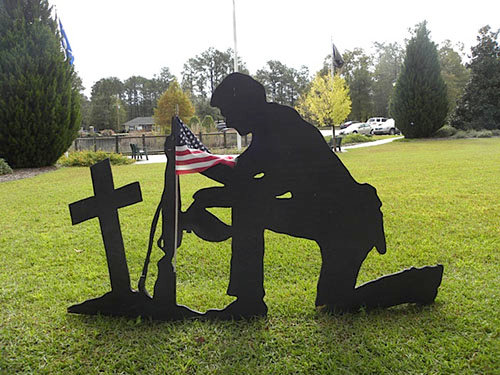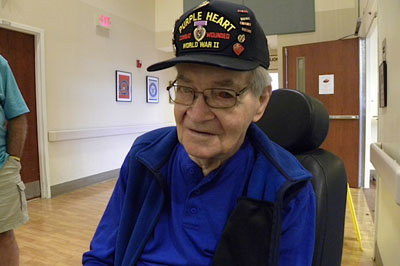 A display honors those who have served in armed conflict for the United States. GERALD HARRIS/Special
A display honors those who have served in armed conflict for the United States. GERALD HARRIS/SpecialI am dreadfully afraid that most Americans are taking their freedom for granted. Because we have been privileged to live in “the land of the free and the home of the brave” perhaps we assume that what we have experienced so far in our lifetimes will continue far into the future. Perhaps many view the frequent vignettes and anecdotes about people losing their freedom as isolated cases hardly worthy of concern.
Perhaps you are one of those who assume your freedom, particularly your freedom of religion, is like the great Stonehenge in Wiltshire, England, which has stood for millennia and will presumably continue to stand for added millennia. I contend that freedom comes at a great cost, but that same freedom can often be lost without so much as a whimper.
Ronald Reagan stated, “Freedom is never more than one generation away from extinction. We didn’t pass it to our children in the bloodstream. It must be fought for, protected, and handed on for them to do the same.”
I contend that freedom comes at a great cost, but that same freedom can often be lost without so much as a whimper.
When I see Christian symbols covered up because of governmental edicts, when I hear that military chaplains are required to do things contrary to their theological convictions, when I see children in our schools who can no longer read their Bibles without fear of reprisals, when I see a football coach who cannot kneel on a football field in silent prayer, when I see added restrictions and regulations placed on churches by city governments, when I see infant lives slaughtered and dissected via abortion I know that our freedoms in America are teetering on the brink of extinction.
We have apparently forgotten the cost of freedom. We have forgotten that eternal vigilance is the price of freedom.
 Jimmy Connelly, 93, served in the Pacific Theater of World War II. Now a resident in a South Carolina Veterans Home, his faith has grown over the years. J. GERALD HARRIS/Index
Jimmy Connelly, 93, served in the Pacific Theater of World War II. Now a resident in a South Carolina Veterans Home, his faith has grown over the years. J. GERALD HARRIS/IndexI went on a six-month search for someone who could give me an illustration of the price that has been paid for our freedom. I recently preached in a revival in St. George, SC and pastor Clay Shook told me about a 93-year-old World War II veteran by the name of Jimmy Connelly. I asked if we could go see him, and the pastor obliged.
Connelly received high praise from his pastor as a devoted Christian and a faithful churchman. The St. George war hero was unashamed of his faith, indicating the he came to know Christ as a young lad and was baptized at Mt. Tabor Baptist Church in Reevesville, SC.
He then added, “But I have been baptized three times – once as a child, again in the Potomac River before going to the Pacific. I just wanted to make sure I had properly obeyed the Lord. I was also baptized in the Jordan River when I took a trip to Israel.”
Connelly recently moved to The Veterans’ Victory House in Walterboro, SC. At the bottom of the large sign at the front of the 220-bed, state-of-the-art, nursing care facility was the phrase, “Home of the Greatest Generations."
The building was massive with a large entrance and a long, wide corridor between the lobby and the dining hall. The corridor was decorated with military memorabilia - each uniform, picture and medal having a story all its on.
When we got to the end of the corridor to make the left turn to go to Chief Petty Officer Connelly’s room, his son, Jimmy, was pushing his wheelchair to the dining hall for a Christian worship service. Since he was 15 minutes early for the service we had a chance to chat for a few moments prior to the service. Although the years had obviously taken their toll on his frail body, his mind was sharp and his recollection of his experience in World War II was remarkable.
Frances, his wife of 70 years, had taken care of him in recent years, but his weakened condition required him to leave their home in St. George and move to the facility in Walterboro, less than 30 minutes away.
Connelly, a U. S. Navy Officer, fought in the Pacific Theater of the War and manned a landing craft or Higgins boat – the kind of boat that was used in amphibious landings in World War II. The much-decorated sailor explained, “As the pilot of the Higgins boat I was the 'taxi cab' driver for the Marines and the landing forces.
The craft could ferry a platoon-sized complement of 36 men to shore at 9 knots. The men generally entered the boat by climbing down a cargo net hung from the side of their troop transport; they exited by charging down the boat’s bow ramp onto shore.
Connelly was engaged in battles in places like Peleliu, Los Negros, Leti, and the Admiralty Islands. The Japanese soldiers who occupied these islands fought the island landings fiercely, killing many Allied soldiers and sometimes, making desperate, last-ditch suicidal attacks.
As the landing forces leaped out of the boats and ran to establish a beachhead the Japanese would unleash a furious attack from their pillboxes and entrenchments and literally mow down the Marines and Army Infantry.
Connelly stated, “I remained on the boat with either a 20 mm caliber or a 50 mm caliber machine gun to provide whatever protection I could to the soldiers trying to establish a beachhead. On one occasion a Japanese artillery shell hit my boat, burned me, and blew me into the water. There were shards of shrapnel that remained in my body for years from injuries received in the war.”
Interestingly, several years ago Connelly began to bleed every time he shaved and couldn’t understand why the blood flowed each time he used a safety razor. He went to his doctor who ordered an MRI in an attempt to diagnose the problem. The strong magnets in the MRI yanked those metal shards to the surface of Connelly’s skin and when he came out of the MRI he was bleeding. The slivers of shrapnel in his neck had somehow caused the bleeding when he shaved.
From his vantage point on the Higgins boat Connelly could see the American soldiers use flamethrowers to flush the Japanese out of their entrenchments. He reminisced, “It was horrible, but I could smell the stench of burning flesh from my vantage point hundreds of yards away.”
Even after seven decades Connelly broke down with emotion when he cited his most heartrending memory. “The most vivid recollection of the war for me was seeing those young soldiers being riddled with bullets and shrapnel when they landed on the beaches. I could see them losing their limbs and dying in the sand; and I can still hear them crying out for their mommas, but their mommas were not there.
“After all these years I still have nightmares from those years in the South Pacific and it still lives with me today. I saw large numbers of our best young men die, but we were there to liberate the Philippines and ultimately preserve our own freedom.
“The representatives of the Japanese government signed the peace treaty on the USS Missouri in Tokyo Bay on September 2, 1945. I got home on Easter Sunday of 1946.”
When asked how he would describe his feelings about getting back on U. S. soil Connelly exclaimed, “I was as happy as a jaybird in a peanut field.”
When asked how he would describe the worth of freedom, he declared, “I considered it worth my life."